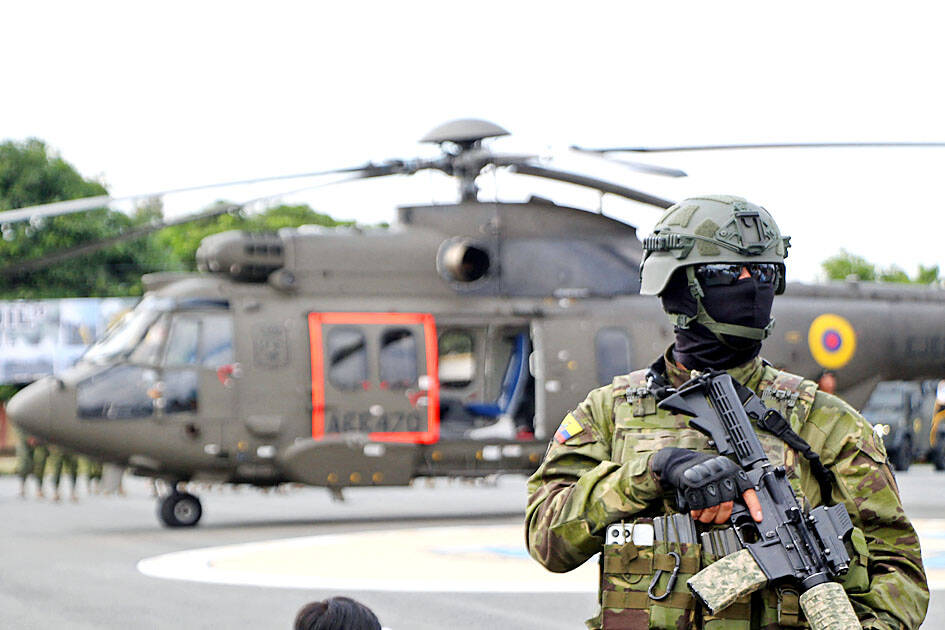Ecuador’s National Assembly on Saturday approved a reform backed by Ecuadoran President Daniel Noboa to arm the government with new legal powers to confront armed groups and dismantle the drug-trafficking networks that fuel their criminal enterprises.
The bill was backed by 84 of the 141 lawmakers who were present in the legislature. Forty-six lawmakers voted against it, 10 abstained and one turned in a blank vote.
Noboa, 37, who began a full four-year term last month, declared an “internal armed conflict” against criminal gangs in January last year, just a couple of months after he was first inaugurated as president.

Photo: AFP
Since declaring the campaign against gangs, Noboa has issued emergency decrees to put military boots on the ground alongside police, significantly ramping up security forces.
He has also overseen an increase in prison sentences for drug-related crimes and is pursuing closer collaboration with the US and other nations for intelligence sharing and resources.
The new legal framework gives Noboa more freedom to redirect resources toward crime-fighting measures.
He would also have the power to pardon police and military personnel for their conduct in security operations.
Officers under criminal investigation would also avoid pretrial detention, but would be subject to evaluations every six months, according to the approved text.
The reforms introduce penalties of up to 30 years in prison for fuel theft, which costs hundreds of millions of dollars for the oil industry. Authorities say this crime, along with illegal mining, has grown in recent years and is a key source of funding for criminal gangs.
Assets linked to criminal groups can be directly seized by security forces, a significant shift allowing for more immediate confiscation compared to previous, often lengthy, judicial processes for asset forfeiture.
People who lead, belong to, or collaborate with these groups will face prison sentences of up to 30 years in prison.
The reforms also include economic incentives for sectors affected by the violence.

In the sweltering streets of Jakarta, buskers carry towering, hollow puppets and pass around a bucket for donations. Now, they fear becoming outlaws. City authorities said they would crack down on use of the sacred ondel-ondel puppets, which can stand as tall as a truck, and they are drafting legislation to remove what they view as a street nuisance. Performances featuring the puppets — originally used by Jakarta’s Betawi people to ward off evil spirits — would be allowed only at set events. The ban could leave many ondel-ondel buskers in Jakarta jobless. “I am confused and anxious. I fear getting raided or even

Kemal Ozdemir looked up at the bare peaks of Mount Cilo in Turkey’s Kurdish majority southeast. “There were glaciers 10 years ago,” he recalled under a cloudless sky. A mountain guide for 15 years, Ozdemir then turned toward the torrent carrying dozens of blocks of ice below a slope covered with grass and rocks — a sign of glacier loss being exacerbated by global warming. “You can see that there are quite a few pieces of glacier in the water right now ... the reason why the waterfalls flow lushly actually shows us how fast the ice is melting,” he said.

RISING RACISM: A Japanese group called on China to assure safety in the country, while the Chinese embassy in Tokyo urged action against a ‘surge in xenophobia’ A Japanese woman living in China was attacked and injured by a man in a subway station in Suzhou, China, Japanese media said, hours after two Chinese men were seriously injured in violence in Tokyo. The attacks on Thursday raised concern about xenophobic sentiment in China and Japan that have been blamed for assaults in both countries. It was the third attack involving Japanese living in China since last year. In the two previous cases in China, Chinese authorities have insisted they were isolated incidents. Japanese broadcaster NHK did not identify the woman injured in Suzhou by name, but, citing the Japanese

RESTRUCTURE: Myanmar’s military has ended emergency rule and announced plans for elections in December, but critics said the move aims to entrench junta control Myanmar’s military government announced on Thursday that it was ending the state of emergency declared after it seized power in 2021 and would restructure administrative bodies to prepare for the new election at the end of the year. However, the polls planned for an unspecified date in December face serious obstacles, including a civil war raging over most of the country and pledges by opponents of the military rule to derail the election because they believe it can be neither free nor fair. Under the restructuring, Myanmar’s junta chief Min Aung Hlaing is giving up two posts, but would stay at the